Speak to one of our experts now about this offer
Call our Africa experts on0800 294 9706
Available until 5pm
Tanzania Hotels & Resorts
Lavish tented camps, remarkable treetop hideaways and spectacular viewing decks… our hand-picked Tanzania hotels are luxurious and wild
Choose exclusive safari lodges with private hot tubs and huge luxury tents in the heart of the Serengeti or dip your feet in an infinity pool overlooking Lake Manyara as buffalo and antelope roam free. Go for exhilarating luxury in a ‘roving camp’ on wheels that follows the path of wildlife or stay in a traditional rondoval close to the Ngorongoro Crater. Whether you want breathtaking treetop suites on wooden stilts or a plush oceanfront retreat on Zanzibar’s coastline, our hand-picked hotels are perfect for stargazing, sundowners and wild at heart dreams on your African adventure.
Our recommended Tanzania hotels
Half Day Spice Tour (from Stone Town, Beaches S/SE & N/NE)
Learn how Zanzibar’s world-famous spices are produced at a local farm. Learn how these precious spices are produced, from seed to harvest and then exported all over the world. The farm is also home to tropical fruit trees such as coconut, mango and papaya, some of which your guide will pick for you to sample.
On this half-day tour, you’ll be picked up from your hotel and taken to one of the island’s top plantations, which has been growing various spices for generations.
Throughout the tour, your guide will point out everything from black pepper, vanilla and ginger to turmeric, cardamom and cinnamon. One of the most famous spices you'll see are cloves, which locals often sun-dry and then squeeze to extract their oil for use in medicated soaps.
Jozani Forest Tour (from Stone Town, Beaches S/SE & N/NE)
Visit the Jozani Forest to spot rare wildlife in a protected natural reserve. Covering over 6,200 acres, it’s a haven of trees and plants known for their medicinal qualities, as well as wildlife including monkeys, bush pigs, tree hyraxes, dik diks and over 40 species of birds.
This three-hour tour starts with a transfer to the forest, which is a protected natural reserve and part of Zanzibar’s only national park, Jozani-Chawaka.
You’ll take a guided walk along the forest trails, stopping to look at the local flora and wildlife. Jozani Forest is filled with various species of trees, including eucalyptus, baobab, mahogany and teak and is a sanctuary for red colobus monkeys. Previously endangered, there are now about 2,500 in the reserve and their numbers are slowly increasing. The monkeys are very relaxed and used to visitors, so you can get incredible photos of them playing in the treetops and feeding on fruit.
Next, you’ll head over the other side of the park to see the mangroves, which are formed by salt water flooding in from the ocean. There’s a wooden boardwalk here which you can wander along for a glimpse into this lush ecosystem. Afterwards, you’ll be transferred back to your hotel in Zanzibar.
Serengeti Hot-Air Balloon Safari
After watching the crew inflate their craft at the launch site, take flight and drift upwards as the sun rises for an entirely different perspective of the Serengeti.
The bright pink-orange haze visible for miles across the vast savannah; a group of grazing zebra becoming distinguishable from their silhouette forms below; a family of elephants wandering just below you. The photo opportunities are incredible. And, wherever you land, a Champagne breakfast will be laid out for you to enjoy. It’s one of the most highly recommended safari experiences.
Stone Town Tour (from Stone Town, Beaches S/SE & N/NE)
Discover UNESCO-listed Stone Town on this half-day trip, from its decorative Arabic doors to daily market life and Freddie Mercury’s former home.
The guided walking tour starts in Stone Town’s slave market, which lies next to the Anglican church and has a moving memorial sculpture. Here, you’ll learn about the sobering legacy of the slave trade in Zanzibar. You’ll get the chance to explore Darajani Market too, which is a hive of activity for locals. Wander around stalls filled with colourful produce and spices, taste some fresh sugar cane juice and spot the town’s famous carved doors.
Next, you’ll move on to visit the former home of famous Queen singer, Freddie Mercury, the Old Fort and House of Wonder, which was built by some of the island’s first British settlers. After learning about these key landmarks, you'll have time to go shopping for wooden carvings, spices or Tanzanite jewellery. The tour ends with a visit the Forodhani food market. This is the most popular place for locals and tourists to gather in the evening on Zanzibar, as it’s full of Swahili food stalls selling all kinds of seafood, pilau dishes and Indian cuisine. If your tour is in the afternoon, you’ll enjoy a golden sunset from this busy market.
Serengeti Adventure from Elewana Serengeti Migration Camp
Spend a full day exploring the wonders of the Serengeti, from Big Five sightings to tracking the Great Migration. Head out in the morning with one of the guides, who have expert knowledge of the Serengeti’s wildlife and terrain. The 4×4 Landcruisers have open roofs and large windows for supreme animal sightings and photography.
As you journey across the Serengeti’s endless plains and woodlands, you’ll see various African animals including giraffes, hyenas and hippos. Rhinos are hard to spot, but you’ll likely see the other members of the Big Five, as well as cheetahs and grazing game. You never know what you’ll encounter. There'll be a packed lunch and a shady place in the bush will be picked to enjoy the picnic accompanied by incredible views.
If you visit the Serengeti during the Great Migration, you’ll also see massive herds of wildebeest, zebra and Thomson’s gazelle. You’ll park up to watch the animals run a gauntlet through the crocodile-infested waters of the Grumeti River. The animals are followed overland by predators searching for a meal, so you might even witness a big cat kill. Outside of the main migration, the Serengeti is still full of wildlife and hosts other natural events, including the wildebeest calving in the grasslands, so it’s a great place to explore all year round.
Sundowners at Elewana Serengeti Migration Camp
Watch the sun go down with a chilled cocktail at the tented camp in the middle of the Serengeti. Located in the path of the Great Migration and surrounded by kopjes, the camp has panoramic views of the endless plains and nearby Grumeti River, where dramatic river crossings take place. After a long game drive, relax on the sunset deck and watch the sun sink down over the Serengeti, before you dine under the stars.
The view is just breath-taking, with the Ndasiata hills in the distance and the mighty Grumeti flowing. You can hear hippos honking as they get ready to go foraging after dusk. Choose from a range of cocktails, wines, beers and soft drinks accompanied by finger food while you watch the evening show. The firepits will be lit as dusk falls and the stars come out, filling the sky with constellations. It's the perfect end to the day.
Witness the Wildebeest Great Migration
The Serengeti is a grand stage for the world’s top wildlife show: The Great Migration. This epic event sees millions of wildebeest, zebra and gazelle make their yearly journey from the Serengeti into Kenya’s Maasai Mara, following life-giving rains and lush grasslands. Track their quest from the comfort of your 4×4 and witness this timeless wildlife spectacle in its various stages – from mass calving on the southern plains to early summer’s scramble north, complete with dangerous crossings over the crocodile-infested Grumeti River.
What’s special about watching the migration in the Serengeti, rather than the Maasai Mara, is that you don’t just get one chance to follow the action. Visit between December and March and you’ll see millions of baby wildebeest nursing on the short-grass plains, or watch the drama of the herds on the move between June and October when they funnel north like a parade of ants. Your guide will know the best places to catch a glimpse of the show – some safari camps have even adopted a mobile set-up, meaning they can migrate right alongside the herds.
Nothing can quite prepare you for this world-famous wildlife display. Known as the largest mass movement of land animals on the planet, the herds move as one snorting, thundering sea of hooves across the parched savannah. It’s a wonder best appreciated from above on a hot air balloon ride or while swooping in to land at your safari camp in a private Cessna. More exciting still are the famed river crossings which bring heart-in-the-mouth moments as the herds stream across the Grumeti, chased from behind by big cats while Nile crocodiles lie ahead, jaws ready to snap. It’s the ultimate safari experience.
Give to local communities while you travel with Lemala
If you want to make a positive impact while you explore Tanzania, just by staying at a Lemala camp or lodge helps to fund many community projects. Lemala has a strong sense of corporate social responsibility, their whole ethos is about giving back and they’re passionate about respecting local cultures and the environment. However, in this part of the world, it’s not about donating a bit of money and hoping for the best – they have to make sure they’re helping in the most efficient way possible.
One of the best ways to uplift communities is by providing employment and training opportunities. Of the 335 staff, only five percent are from outside of Tanzania, the rest are from towns and villages near the camps and they’ve also employed staff from a homeless centre in Arusha. People often arrive unskilled and are trained to work in various roles – the guide training school is very successful. They’ve had long-serving members of the team who started as room attendants or cleaners and have since become safari guides or camp managers.
They also run an annual Leadership Academy where they invite speakers such as accountants, businesswomen and guides to talk to young people in their communities. The aim is to inspire kids and give them realistic career options. They are especially keen to champion women in the workplace and six out of seven members of the management team are women. They now have two fully-qualified female guides including Tanzania’s first, Mary Milanzi, who now leads tuk-tuk tours in her hometown of Mto wa Mbu.
Your stay funds a number of other projects including a women’s shelter called Pippi’s House and a reusable sanitary pad scheme where they provide pads for girls in need. This scheme has expanded and they now work with a woman to educate about sexual health.
Eco-awareness is very important to them too. All Lemala tented camps operate 100 percent off-grid and are completely sustainable. They’ve invested a lot of money in solar power systems and reverse osmosis water treatment plants, which provide safe drinking water for guests and surrounding communities. When they build a new camp, they use recycled steel where possible and decking that has been made from recycled plastic bottles. In just one year they saved around 300,000 plastic bottles from going to landfill. They also work with a scheme that employs local women to make biodegradable banana boxes for guests’ packed lunches.
You can also be sure that when you stay with Lemala, the cultural excursions they offer are ethical. For instance, they run private, authentic visits to Olasiti Village in Tarangire, where they have an extremely close relationship with Chief Lobulo. In exchange, they support the chief’s passion for education, helping to fund his school programmes. Guests can even donate a school desk and chairs made from recycled plastic for $135. When you visit the boma, you can buy hand-made curios straight from women. In a country where you can feed someone for less than a dollar a day, your $5 makes a big difference.
SkySafari Flight to Tarangire
Soar above Tarangire National Park in a luxurious eight-seater light aircraft. This is the first flight of the 10-day SkySafari trip in Tanzania, which takes you from Arusha to the elephant-filled plains of Tarangire and UNESCO-listed Ngorongoro Crater, ending in the world-famous Serengeti.
It’s a very scenic journey that offers views of rolling hills and forested areas, then lush green waterlogged terrain as you swoop in to land at Kuro Airstrip. On the final approach into Tarangire, there’s a large swamp area where animals like to graze and you’ll often spot elephants and buffaloes here - your safari really does start from the air.
Sundowners at Tarangire Treetops
At Tarangire Treetops, there is a special sundowner spot called Sunset Hill, where you can enjoy a chilled drink while watching the sky transform with dramatic shades of orange and pink. After a day of exploring nearby Tarangire National Park, which is home to some of the largest elephant herds on the continent, there’s nothing better than taking a moment to sit back, relax and enjoy the iconic African sunset.
The viewpoint lies just ten minutes from Tarangire Treetops and is surrounded by ancient baobab and marula trees. When you arrive at Sunset Hill, the team will serve you with a variety of drinks and snacks while you settle in to savour the view. You might spot herds of antelope crossing the plains or parades of elephants in the distance as dusk falls and the sky gets ready to welcome a tapestry of stars.
Kilimanjaro Scenic Flight
Soar above Africa’s highest mountain on this Kilimanjaro scenic flight. The one-hour trip departs from Arusha airport and passes over the national park, providing aerial views of ancient craters and herds of animals. You’ll fly in a Cessna Grand Caravan, which can accommodate eight passengers in window seats. This type of aircraft is used all over the world for scenic flights and has high wings that don’t obstruct the view.
The one-hour trip departs from Arusha airport at 7.00am. When you board the plane, you’ll be given a headset and tablet loaded with an audio app that has geolocation tracking, so you can learn about the landmarks below as you fly. As you climb high above the clouds, Kilimanjaro dominates the view with its sparkling glaciers and mighty peaks.
The flight is run by Ruka Africa, the pioneer of Kilimanjaro flights, in partnership with Grumeti Airline. The flight route follows a figure-eight path on the northern side of Mount Kilimanjaro, so you’ll see everything regardless of which part of the plane you sit in. What’s more, Ruka Africa works with Carbon Tanzania, an organisation that plants trees in key areas of the country to offset their emissions.
Mountain biking in Arusha National Park
Connect with nature on this relaxed mountain bike tour through Arusha National Park. The trip lasts three hours and starts at the Momela Gate, which leads down to a single track through the forest. You’ll be fitted out with a top-quality mountain bike and safety gear for the trip, which is all about highlighting Arusha’s natural history and wildlife, as well as encouraging sustainability.
You’ll cycle downhill through an ancient forest filled with huge native trees. Arusha lies on the slopes of Mount Meru, a large volcano, and in places there are ponds which draw fantastic birdlife and animals such as bushbucks, zebra, warthogs and wildebeest. Stop at viewpoints along the way to chat with your guide and learn about Arusha’s geography and wildlife. To ensure the experience is as intimate as possible, there’s a maximum of eight guests per tour and plenty of rest stops so you can absorb the scenery.
Bean-to-Cup at Arusha Coffee Lodge
Learn all about the history of coffee in East Africa on this bean-to-cup tour. It’s a one-hour walk through the plantation at Arusha Coffee Lodge, where you’ll discover the entire coffee-making process, from planting to harvesting and roasting the beans.
The walk itself is lovely as you get to stroll among the lush fields, entertained by monkeys and bush babies, while birds sing in the indigenous trees.
During harvest season, you can join the coffee pickers to experience the art of selecting ripe beans. The best part of the tour for most guests is getting to taste a freshly-brewed cup of coffee from the fields. You also have the opportunity to buy the beans from the store.
Shanga Social Enterprise
Give back while you travel by visiting Shanga, a social enterprise that employs Tanzanians with disabilities to make gifts from recycled materials. Visits usually last at least an hour and start with a brief sign language session so you’re able to greet the team. You’ll be taken through the workshop to departments, which include weaving, beading, glass blowing and woodwork. Everything is made from recycled materials whilst shredded paper and cooking oil fire the furnaces.
Shanga is based at Arusha Coffee Lodge and became part of the Elewana Corporate Social Responsibility Program in 2017. They have two main missions: to employ as many people with a disability as possible and to make the products with recycled materials. They currently employ 52 people, 35 of whom have some sort of disability. In 2019 they saved up to 100 tonnes of waste from going to landfill. The main focus of the tour is to remove the stigma that people with disabilities often face.
Some of the staff have faced huge challenges because of their disabilities; many are deaf, have prosthetic limbs or are in a wheelchair so just getting an education and a job can be a mammoth task. Through word of mouth though, they get a lot of people come to them looking for work and when there’s a vacancy, they train applicants to make everything from necklaces to shopping bags and glass vases.
There are lots of activities you can take part in too. Sit with a team and make a bracelet or shopping bag and try trickier tasks like weaving, Tinga Tinga painting and glass blowing. Guests love the face-to-face interaction with the team and seeing how happy they are to work at Shanga. At the end of the tour, you can browse the gift shop. All the profit from sales goes straight back into Shanga and gives them the chance to employ more people with disabilities in Tanzania.
Experience real Tanzanian village life in Mto wa Mbu
Visit Mto wa Mbu to experience life in a thriving village which lies on an escarpment in the Great Rift Valley. This is a very successful agricultural area because of the volcanic soil and spring water that runs down from the escarpment, allowing for year-round irrigation. Mto wa Mbu also sits on the road from the Serengeti to Ngorongoro, so it’s become a key trading point, home to people from over 120 different tribes. It’s a great place for you to get a taste of local culture and farming traditions.
The walking tour usually lasts two hours and can be tailored to your interests. As you explore, you’ll see farmers on motorcycles transporting bunches of bananas and women carrying huge baskets of produce on their heads, chatting with their friends. You’ll pass the school and walk around the market, which is full of stalls selling vegetables and fruit. Along the way, you’ll get to talk to the traders selling their crafts, as well as food vendors who serve meals straight from a large pot. If you’re brave enough, you can even test the fiery, locally-brewed alcohol.
Guests enjoy touring a nearby rice paddy and banana farm, where you’ll get to meet the farmers and learn how food is grown and harvested. Local people know that a fee is paid for the tour, which goes back into helping the community, so they’re very happy to have visitors.
Watch the sunrise at Gilman’s Peak on Mount Kilimanjaro
On your quest to conquer Mount Kilimanjaro, enjoy a magical moment watching the sunrise from Gilman’s Peak. This is a highlight of the eight-day Rongai route, which is one of the easiest and most scenic treks up Kilimanjaro. After days of hiking through montane rainforest, moorland and alpine desert, you’ll wake the evening before summit day at 11.30pm for tea and biscuits before beginning your slow shuffle towards the peak.
Due to the freezing temperature, altitude and steep path, you’ll move very slowly – poli poli – through the darkness. After a brief rest stop at Hans Meyer Cave, the rocky path zigzags up to Gilman’s Point, which sits at 5,756 metres above sea level on the crater rim. It’s the most challenging part of the trek but you get such a sense of achievement when you arrive to watch the sun rise and the sky change colour above the clouds.
Dine in style on the Ngorongoro Crater floor
Enjoy a special bush lunch right on the Ngorongoro Crater floor, surrounded by wildlife. Ngorongoro Tented Camp is just a 15-minute drive from the crater, so you’re usually the first ones there around 6.30am, ready to explore the heritage site’s diverse mix of lakes, forests and plains which are home to a large concentration of wildlife. Before lunch, you'll spend a few hours looking for members of the Big Five, migratory birds and grazing game, not to mention endangered rhinos who thrive on the crater floor.
As you drive into the private picnic spot, you will smell the barbecue cooking. You'll be amazed to see a bar and tables set up for the feast. There’s a range of freshly-cooked hot meat as well as salads and sides to enjoy. As you eat, you’re surrounded by beautiful scenery; swamps where hippos wallow and acacia trees are filled with birds and monkeys.
Spa Day at Elewana The Manor at Ngorongoro
Treat yourself to an indulgent spa day at Elewana The Manor Ngorongoro. Nestled within the Shangri La Coffee plantation and surrounded by hills, the stately home is the ideal place to enjoy a rest day on your Tanzania trip.
Start with a dip in the pool and then head to the spa, where there is a peaceful treatment room. The skilled therapists offer a range of massages with various oils, tailored to your personal needs, as well as manicures, pedicures and facials with Healing Earth products.
The High Tea experience is the perfect way to follow your spa session. A charcuterie served with a selection of cured meats, cheese, pickles and preserves, as well as fresh fruit, artisan breads and two sweet options. The focus is on healthy options, moving away from gluten and starch, served with plenty of fresh coffee from the estate. You can enjoy the High Tea in the lounge, dining room or out in the gardens, where you can admire views of the rolling green hills.
Soak in the Maji Moto hot springs at Nyerere National Park
Follow your guide through indigenous forest to a hidden hot spring, where you can swim in warm, sapphire waters. The Maji Moto hot springs are just a short drive from Mivumo River Lodge, yet it feels like the sparkling pools are in the middle of nowhere – it’s as if you’ve discovered your own private forest bath. Guests love having the opportunity to walk and bathe among nature after being stuck in a safari vehicle.
When you arrive at the site, your guide will take you on a hike through the thick woodland where you’ll be surrounded by bird calls. Eventually, you’ll emerge at a secret ravine covered with lush vegetation where you’ll find the hot pools. These are formed when sulphurous water flows over the rocks, creating a series of beautiful ponds where you can soak in soothing waters. It’s the perfect way to relax after a hectic safari schedule.
Sundowners at Mivumo River Lodge
Enjoy a safari experience that dates back to the 1920s - watching the sunset over the African landscape while sipping a chilled cocktail. After a day spent on game drives spotting spectacular wildlife with your guide in Nyerere National Park, sit back and relax as you are taken by boat to the special sundowner spot on the sandbank. As you drift down the Rufiji river, look out for hippos and crocodiles, as well as animals on the banks munching leaves or having a drink.
The sundowner site will be set up for you with tables and chairs, plus a selection of cold drinks and snacks. Sit down and share stories with your guide while watching life unfold on the river as the sun goes down, turning the sky dramatic shades of orange and red. It’s a signature safari experience and guests love the tranquil riverside setting. It’s just magical for photographs and the perfect way to end your day at Mivumo River Lodge.
World-class dives and canoeing through the mangroves on Pemba Island
Pemba is a paradise for people who love water activities, from exploring world-class dive sites to canoeing through thick mangrove forests. At Fundu Lagoon, they are lucky to have the Misali Island Marine Conservation Area right opposite the resort and guests are taken there every day to dive and snorkel.
At Fundu Lagoon, they are lucky to have the Misali Island Marine Conservation Area right opposite the resort and guests are taken there every day to dive and snorkel. It has a white-sand beach that drops directly into the Indian Ocean. You can swim for just 20 metres and you’re on an unspoiled reef, which is amazing for snorkelling.
Often included in lists of the world’s best diving destinations, Pemba has thousands of exciting sites around the island to explore. They have their own five-star PADI centre with courses and equipment for all abilities, from beginners to experienced dive masters. Everything is arranged for you, you just have to step on the boat and your gear’s there, ready to go.
There are 30 dive sites that are regularly visited, including a big tanker wreck and coral reef wall dives, plus shallow sections for beginners. You could do three dives a day for a week and visit a different site each time. The coral is pristine and home to all kinds of colourful marine creatures, including turtles. It’s a great extension of your safari on mainland Tanzania and a chance to sample the country’s diverse marine wildlife.
Also recommended is canoeing in the nearby mangrove forest. One of the local guides will take you in a traditional, dug-out wooden canoe across the bay to an unspoilt tangle of mangroves. As you sail through the narrow canals, it’s like going back a thousand years, you’re surrounded by birds and parrots and it feels like sailing through the Amazon.
Sorry, your hotel is no longer available
Please check alternatives
-
{{item.body}}
-
{{item.body}}
Choose a departure date
{{store.searchDuration}} nights
Enter rooms & guests
Checking prices & availability

{{term}}, {{formattedDate}} for {{searchDuration}} nights
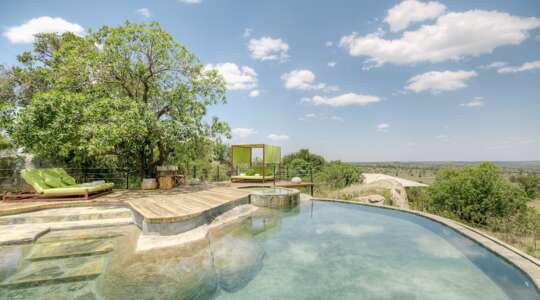
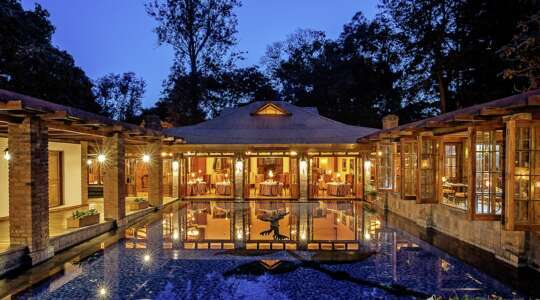
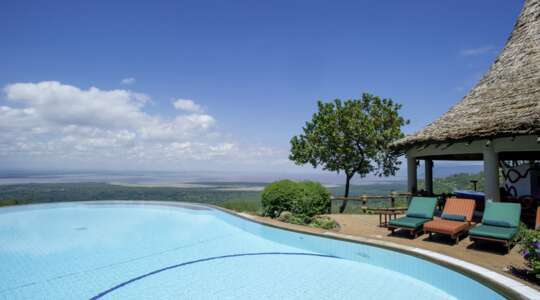
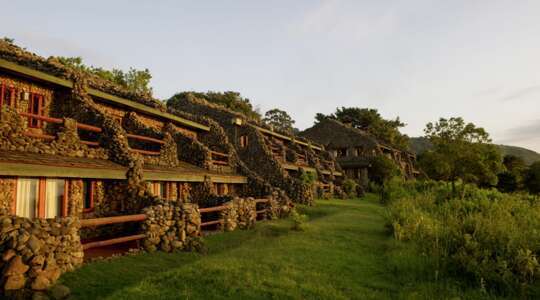
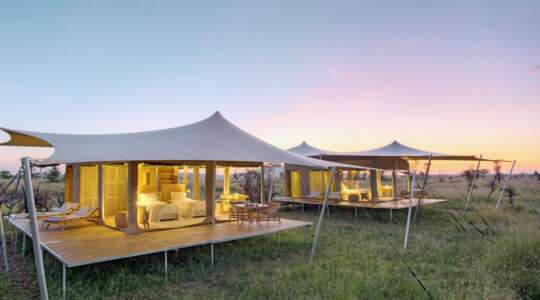
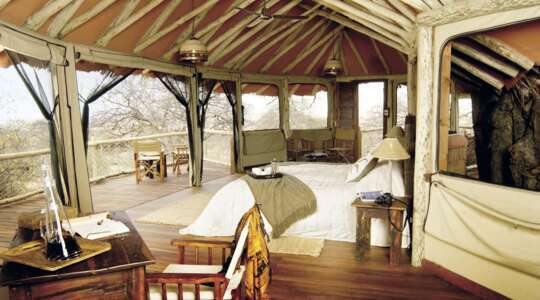
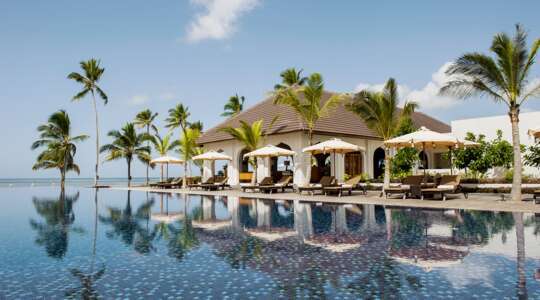
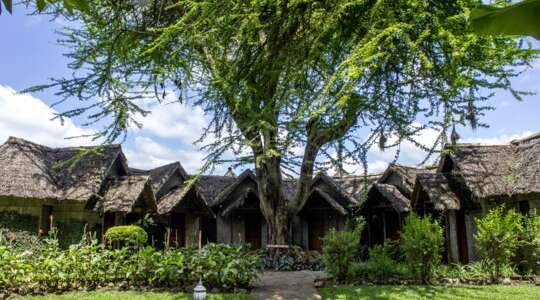
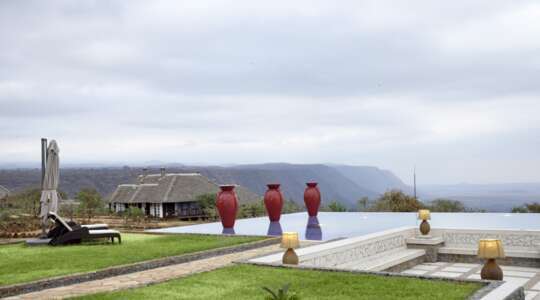
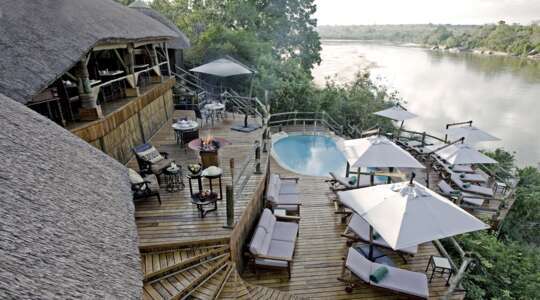
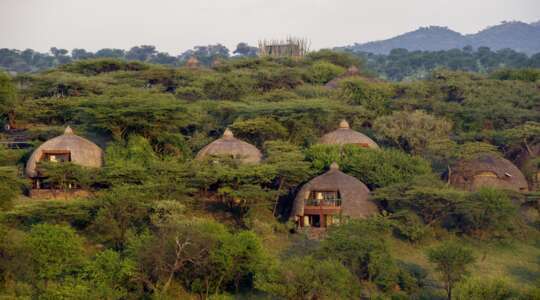
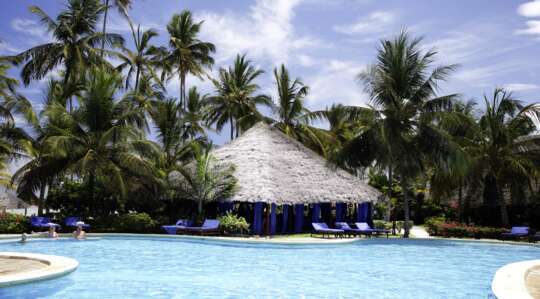
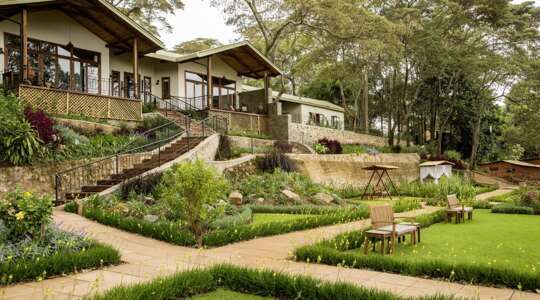
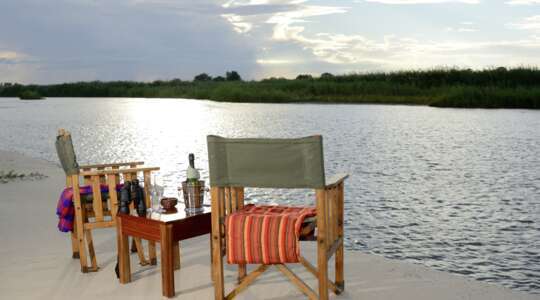
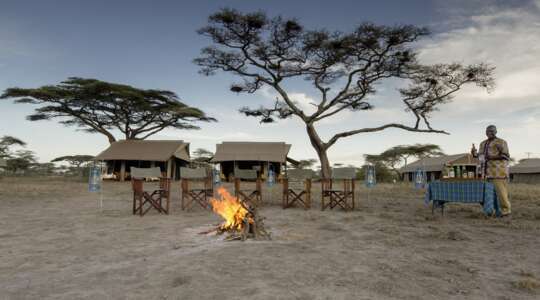
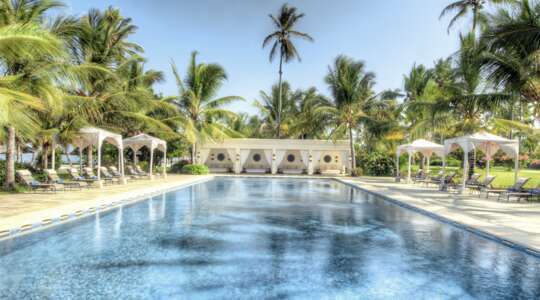
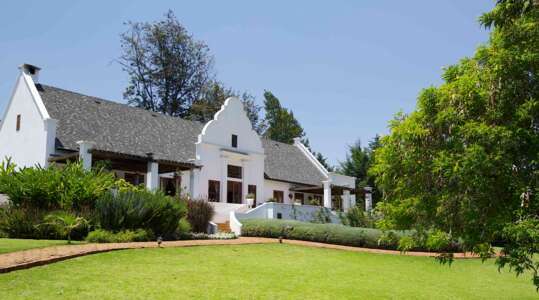
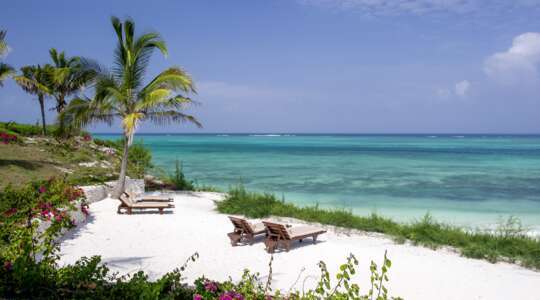
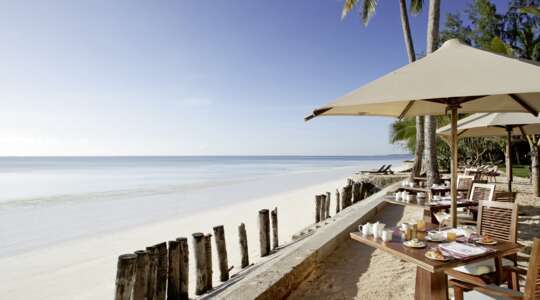
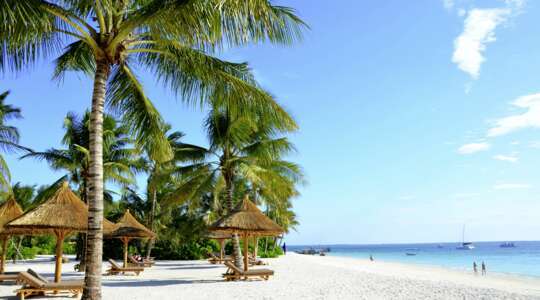
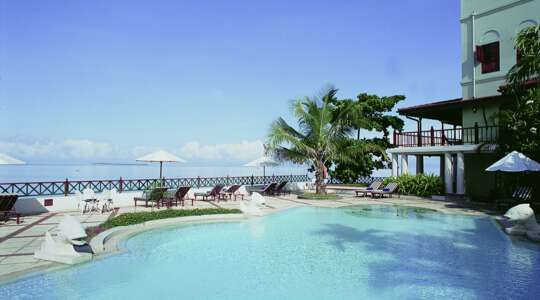
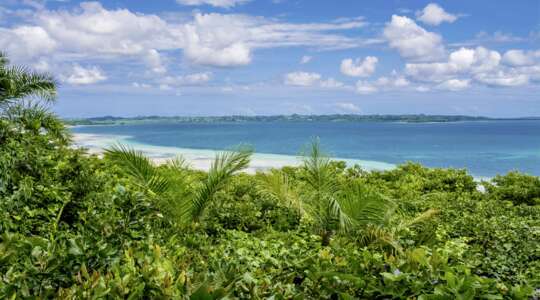
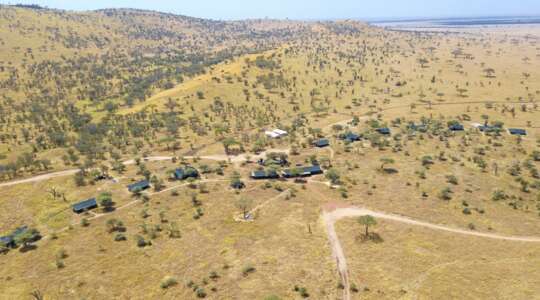
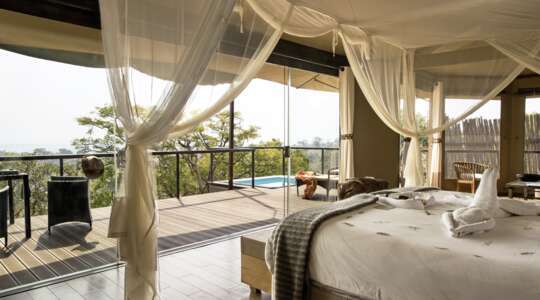
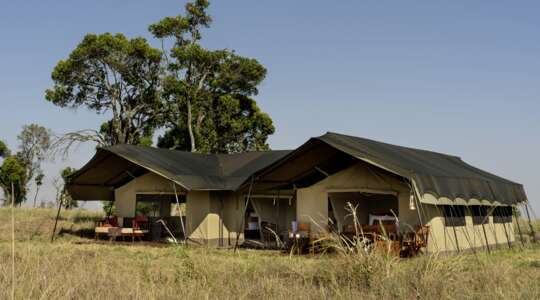
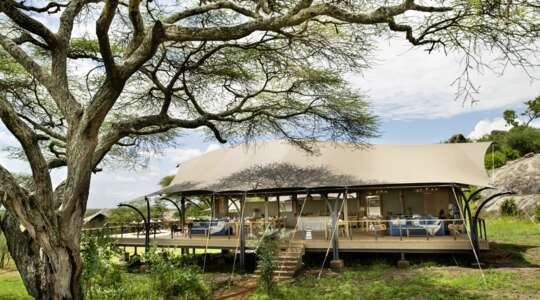
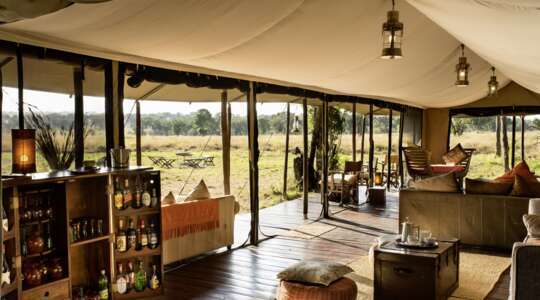
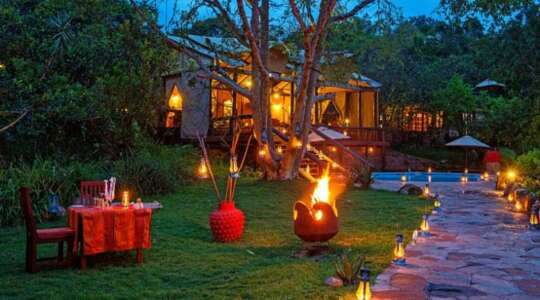
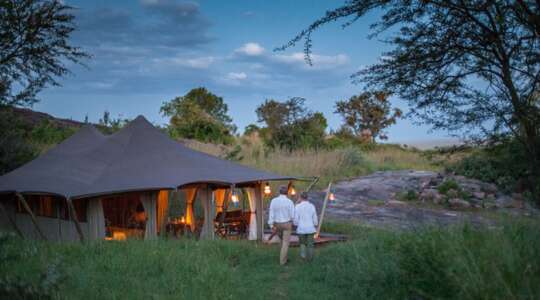
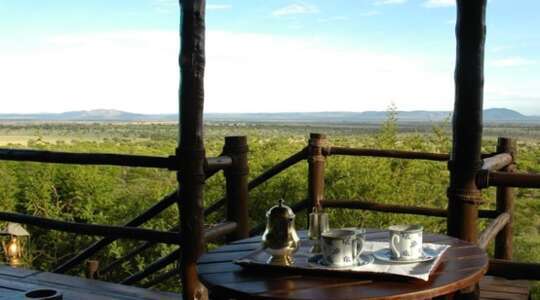
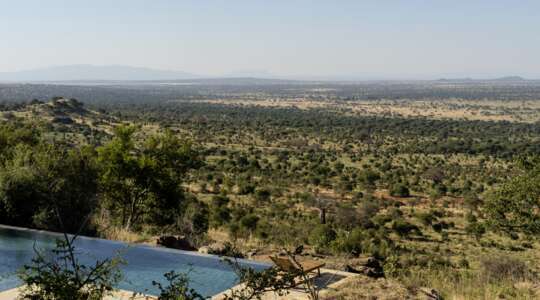
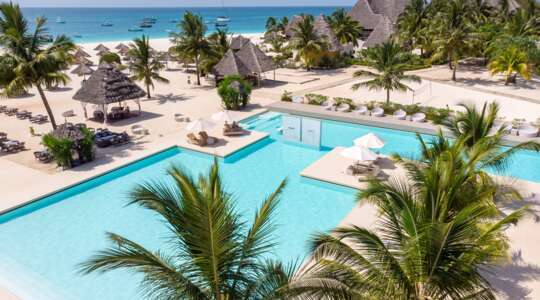
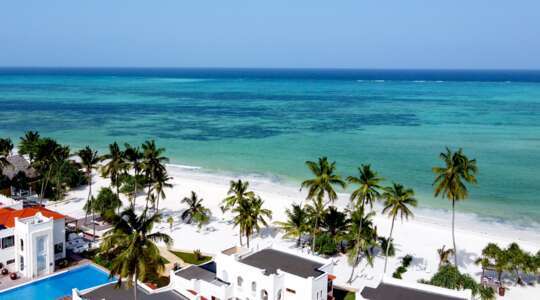
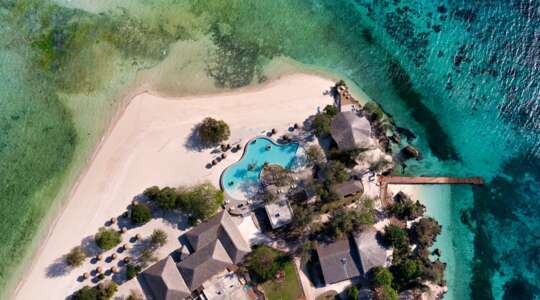
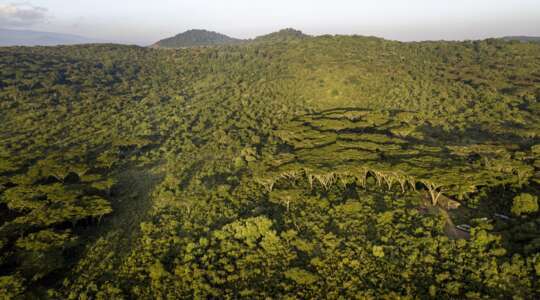
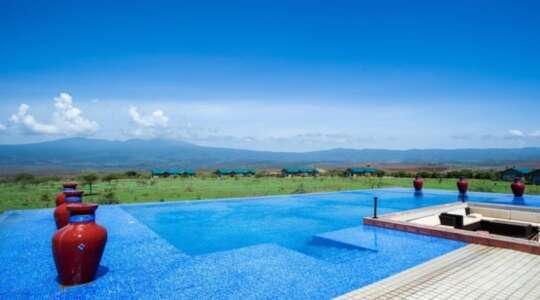
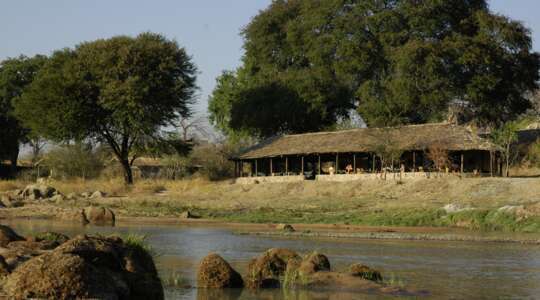

_w=24_h=25.png?v=11cbf9448902371bca1085014eba9ac82a696589)
_w=24_h=25.png?v=11cbf9448902371bca1085014eba9ac82a696589)
_w=24_h=25.png?v=11cbf9448902371bca1085014eba9ac82a696589)